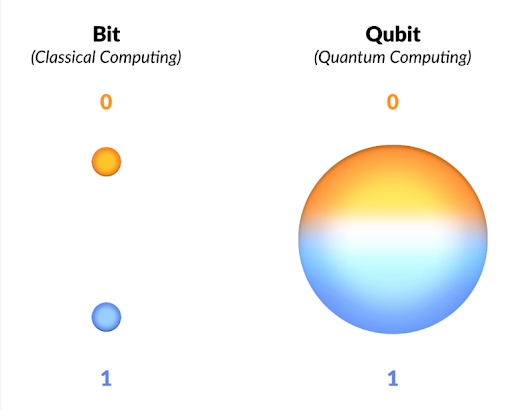How do Quantum Computers Work?
Classical computers encode information in bits. Where each bit can take a value of either 1 or 0. These bits work as ON and OFF switch that is ultimately used by the computers for making decisions. On the other hand, quantum computers are based on qubits that are operated on two key principles of quantum physics: superposition and entanglement.

Superposition states that each qubit can represent a 0 and a 1 at the same time. Whereas entanglement means that qubits in a superposition can be correlated with each other, i.e., the state of one can depend on the state of another. When using these two together, qubits start acting as more sophisticated switches. This enables the computer to function in ways that allow them to solve the complex problems that are unmanageable using today’s computers. The end result is a computer that can calculate very large and complex problems in minutes that would normally take a classical computer YEARS to compute!
How will they impact our daily lives?
Quantum computers will most likely NOT replace classical computers for most tasks, at least not at first. We will most likely see them implemented in large, complex computation tasks for large companies or organizations. Tasks such as modeling molecules and how they interact with the human body, or finding the optimal routes for all package deliveries simultaneously. It’s better to think of quantum computers as something that will work in parallel with classical computers rather than something that will replace them altogether.
What does this mean for data scientists? (Why should we care?)
ML algorithms today are limited by the computational power of classical computers. Quantum computing is capable of administering large data sets at much faster speeds and can supply data to AI technologies to analyze data at a more granular level to identify patterns and anomalies. Quantum computing also can help integrate data by running comparisons between schemas to quickly analyze and understand the relationship between two counterparts. To give a bit of perspective, Google’s Sycamore is reported to have solved a problem in 200 seconds that would have taken today’s fastest supercomputer 10,000 years to solve. This opens new possibilities for the future of big data and analytics.
Quantum Computer for public use?
There is a groundswell of opinion that commercially viable quantum computing is closer than anyone thought. I think this is an optimistic view. A reliable device based on quantum mechanics seems aspirational. Solving the problems of noise, fragility, and cooling to create a reliable quantum state, and then just the manufacturing technology needed, is daunting.
New materials are needed that haven't been invented yet to put one million qubits on wafer to solve the truly important problems. Nevertheless, computers with 100 qubits have been shown to have some potential. There are operational quantum computers already for public use. Amazon offers three quantum computers in the cloud.
- D-Wave - Advantage system is an annealing quantum computer with 24 qubits.
- IonQ is a universal gate quantum computer with trapped ions. More specifically, there are 11 qubits made out of Ytterbium with a trap-chain defined by a laser.
- The Rigetti is another computer with superconducting qubits. It has 30 qubits (more than IonQ).
Microsoft Azure, IBM and Google also offer quantum computing in the cloud. However, if someone predicted ten years ago that supercomputers would reach three exaFLOPS by 2021, I would have been skeptical.
In conclusion, Estimates of the commercial availability of quantum computing range from "right now" to "ten years." No matter when, one thing is certain: encryption is in peril. A quantum computer has enormous power to break anything digital.
All of the encryption models used today will be child's play for a quantum computer. That should keep all of us awake at night.
Thanks for reading, have a good time.


